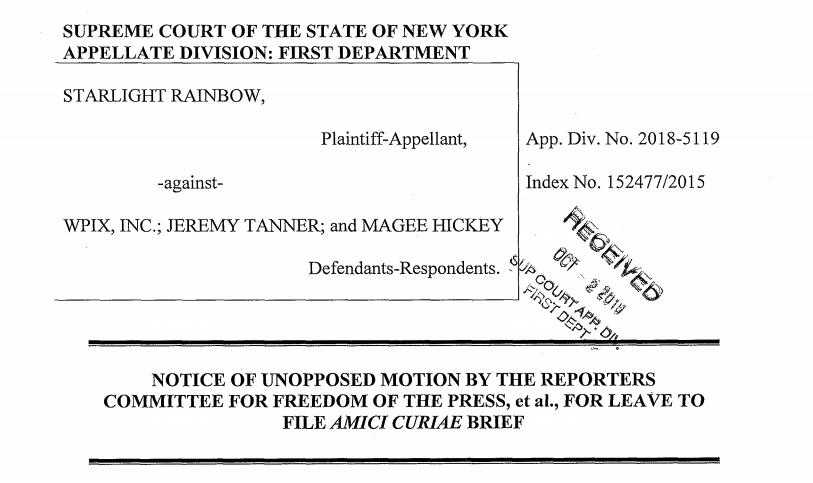Outcome of NY defamation case could impose unrealistic burdens on media

Update (Jan. 23, 2020): On Jan. 23, 2020, the New York Appellate Division, First Judicial Department, ruled in favor of WPIX and affirmed the trial court’s grant of summary judgment. The court determined, as the Reporters Committee argued in its friend-of-the-court brief, that a media organization cannot be held liable for failing to issue a timely correction.
The Reporters Committee for Freedom of the Press and a coalition of 20 media organizations filed a friend-of-the-court-brief on Oct. 2 supporting a local New York broadcast news outlet, WPIX, in a defamation case involving the publication of a story about a fifth-grade student who accused her teacher of bullying.
The story, published in March 2015, reported the wrong name of the teacher based on information from the student and parent, who said that the teacher’s name was Starlight Rainbow. The teacher’s name was actually Cynthia Rainbow, and Starlight was coincidentally the name of another teacher, who is now suing WPIX for defamation.
In the lawsuit, Starlight Rainbow seeks to expand the definition of “gross irresponsibility,” the applicable standard under New York law. As the media coalition brief explains, she wants to hold journalists and news outlets liable for “merely negligent reporting or for failure to issue a correction.” She also argues that a journalist’s source must be either “authoritative” or “official,” not just “reasonably reliable” as New York law currently requires. This is a “wholly made up standard that is inconsistent with New York law,” the brief argues.
Reporters Committee attorneys argue that an expanded definition of gross irresponsibility and a requirement to consult only “official” sources goes against the nature of reporting on matters of public concern, as “reliable yet unofficial sources are necessary for effective journalism.” Investigative reporting often relies on sources from outside official channels to bring attention to abuses by public officials, and the reevaluation of what constitutes a “reasonably reliable” source would make reporters and news outlets more susceptible to unnecessary liability and change the nature of reporting on stories of public interest.
Reporters Committee attorneys also argue that the reporter’s actions do not fit the description of gross irresponsibility because the story relied on direct and legitimate sources — the parent and child — for the name of the teacher in question. The reporter also attempted to check this information with the New York City Department of Education and was told that “these are serious allegations and we will be investigating,” which could be interpreted as an affirmation of the correct name.
“New York law is right to protect journalists who rely on information from reliable sources, and that rule requires affirmance in this case,” Reporters Committee attorneys argue in the brief.
The brief also cites N.Y. Times Co. v. Sullivan, a landmark defamation case in which the U.S. Supreme Court said “erroneous statement is inevitable in free debate,” and “it must be protected if the freedoms of expression are to have the breathing space that they need to survive.”
WPIX removed the story from its website in response to Starlight Rainbow’s defamation lawsuit which, according to the coalition brief, also argues that the news outlet should be held liable for “failing to correct or retract the story in a timely manner after she attempted to alert the station to the error.”
New York courts have never held the news media liable for failing to issue a timely correction, and “this one should not be the first,” the brief asserts. Imposing such a standard could heighten publishers’ inclinations to retract stories out of fear of liability, chilling reporting on stories of public concern.
“News organizations need time and space to determine whether a request reflects a legitimate issue with a story or instead comes from someone unhappy with the truth,” the brief notes.
Read the media coalition’s full brief in Rainbow v. WPIX.
The Reporters Committee regularly files friend-of-the-court briefs and its attorneys represent journalists and news organizations pro bono in court cases that involve First Amendment freedoms, the newsgathering rights of journalists and access to public information. Stay up-to-date on our work by signing up for our monthly newsletter and following us on Twitter or Instagram.